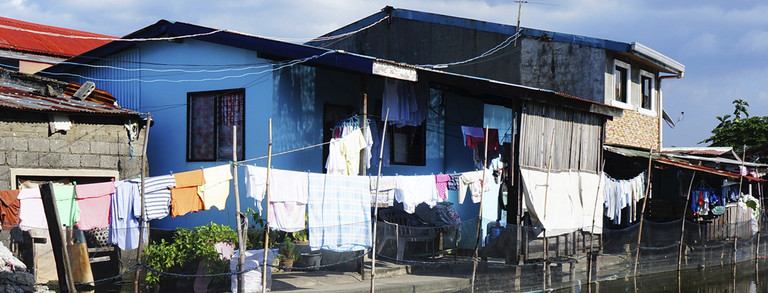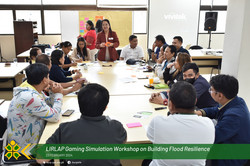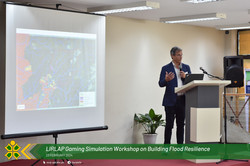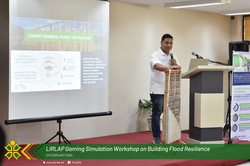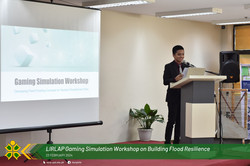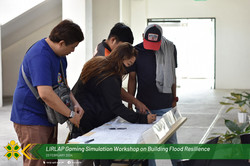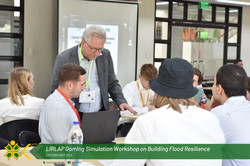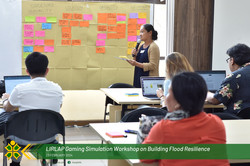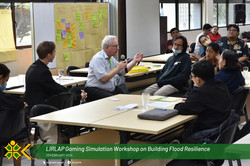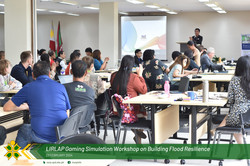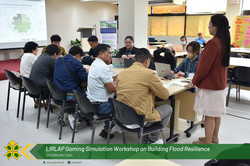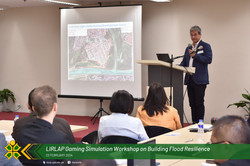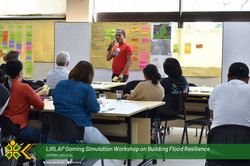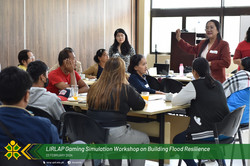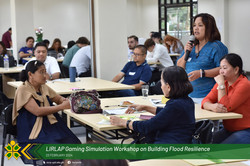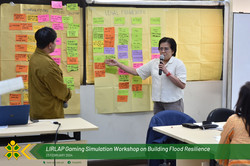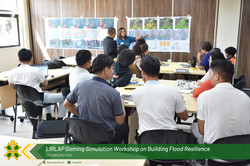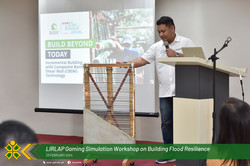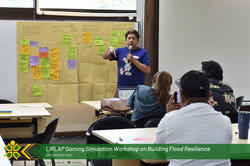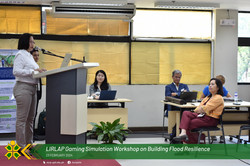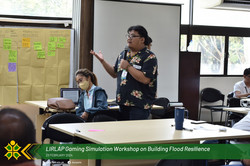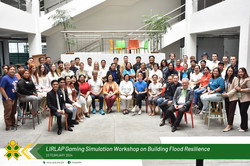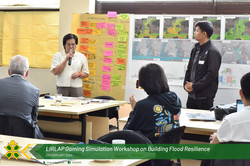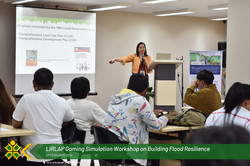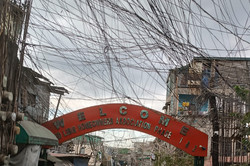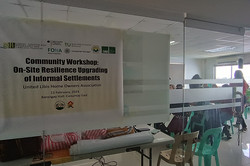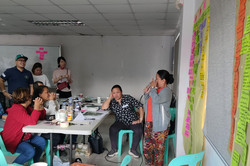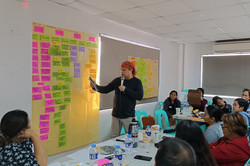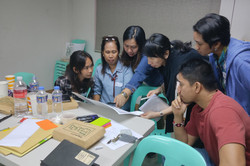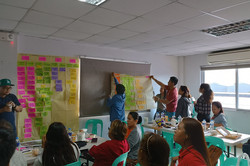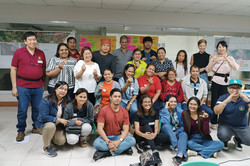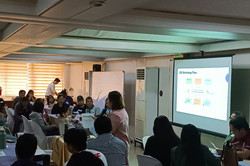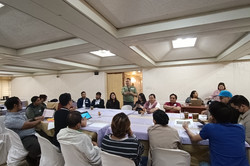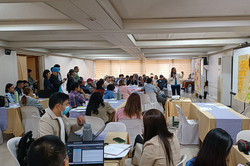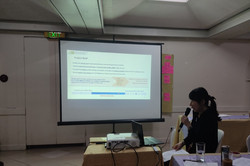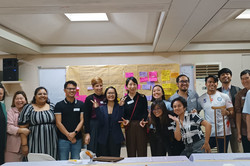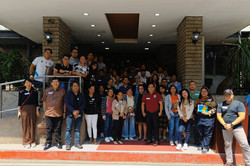UP SURP Hosts LIRLAP Gaming Simulation Workshop on Building Flood Resilience
On 23 February 2024, UP SURP hosted the gaming simulation workshop organized by the Linking Disaster Risk Governance and Land-Use Planning (LIRLAP) project to develop flood proofing concepts for Kasiglahan Village, a resettlement area in San Jose, Rodriguez, Rizal.
The workshop gathered a multi-sectoral assembly of participants from national government agencies, local government units, concerned formations, and residents of the area. UP SURP faculty and staff shared their expertise and assisted in the conduct of the two-part gaming simulation which explored various structural means of coping with the flood and investigated the ways in which the proposed measures can be adopted in line with the current practices being implemented.
Read more about the workshop here: https://www.surp.upd.edu.ph/event_8.html
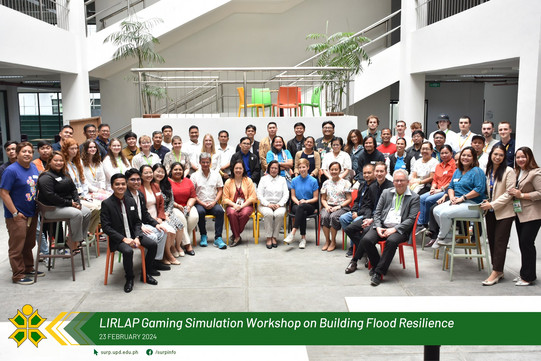
LIRLAP WP2 Resilience Upgrading Conducted Community Workshop and Gaming Simulation Workshop, in Metro Manila, February 2024
Crafted by: Team of LIRLAP WP2 Resilience Upgrading, March 2024.
Spearheaded by LIRLAP WP2 Philippine team, research specialists composed of Prof. David Yap, Prof. Sheilah Napalang, and Mr. Vincent Eugenio along with LIRLAP Philippine Project Coordinator Ms. Sonia Islam worked together with Dr. Juan Du from TU Dortmund and Prof. Mathias Kaiser from KaiserIngenieure Dortmund, on two back-to-back workshops during the second week of February 2024. Their overarching mission was to empower local stakeholders and collaboratively explore solutions for the upgrading pilot site ULHOA in Canumay East, Valenzuela city. They aimed to identify innovative and adjustable planning instruments for the pilot site, during its transition from being an informal and disaster-prone area to a permanent, livable and safe settlement at an acceptable level.
On Feb. 13, the barangay and community representatives welcomed WP2 team at the Canumay East Barangay Hall. Community workshop participants were grouped into three cohorts, each tasked with addressing pertinent topics, specifically Incremental Housing and Site Development, Community-Based DRRM and Flood Risks and Interventions. The local technical NGOs RADIC and TAMPEI assisted in facilitating and documenting the outputs of the three groups. Under the overall guidance and moderation of Mr. Vincent Eugenio, the community collectively identified the most pressing developmental challenges and potential proposals for the gaming simulation (GS) workshop.
Incorporating real-world data and building upon the consensus garnered from the community workshop, the GS workshop, a dynamic forum wherein a diverse array of multi-stakeholders convened on Feb 16th was held at the University Hotel in Quezon City. A video message delivered by LIRLAP Project Leader Prof. Stefan Greiving from TU Dortmund accentuated the criticality of stakeholder engagement in shaping the project's trajectory. Philippine Team Leader Prof. Dina Magnaye extended a warm welcome to the attendees. Mr. Vincent Eugenio presented the message in the Endorsement Letter from Representative Francisco Benitez, Chairperson of the Housing Committee of the House of Representatives. The Letter acknowledged the timely importance of on-site resilience upgrading and called for advocacy of all potential partners’ support for LIRLAP. Based on their real-life work duties and experiences, participants were categorized into three Gamers’ Groups for planning decision-making simulation, along with the same three topics of the community workshop. Under the guidance of Prof. Sheilah Napalang, they delved into the complexities of ULHOA and contemplated solutions spanning from retrofitting and upgrading to community-based DRRM and the feasible flood interventions for the pilot site. Prof. Kaiser reported his findings and technical solutions regarding the on-site flood interventions.
A notable highlight of the GS workshop was the afternoon session Workphase of “Conflict Resolutions and Compromise” among all stakeholders, based upon their Gamers’ Group work results. Participants confronted the implications of policy decisions, accentuating the pivotal role of adjusting legal-binding requirements in assimilating proposed solutions into the ongoing development of ULHOA. The negotiations were discussed in a controlled atmosphere and were significantly constructive. Representatives from agencies strived for doable agreements and innovative planning adaptations regarding resilience building of Informal Settler Families (ISFs) and the community’s common future. Together with ULHOA Representative, representatives from the following organizations and government agencies participated: 3rd Engineering District of the Department of Public Works and Highways, the National Grid Corporation of the Philippines, the Presidential Commission for the Urban Poor, Social Housing and Finance Corporation, and the Valenzuela DRRM Office. Utility providers such as MERALCO and Maynilad were also involved, along with CSOs and NGOs including the Foundation for the Development of the Urban Poor, TAMPEI, RADIC, Build Change, Habitat for Humanity, etc., which have been active in ISFs’ housing and retrofitting activities. The outcomes of the GS workshop provided input for Dr. Mia Wannewitz from the Ludwig Maximillian University in informing the policy uptake.
In conclusion, Dr. Juan Du from TU Dortmund underscored the collective resolve towards fostering the feasible overall site development of ULHOA for the LIRLAP project’s forthcoming implementation phase. She emphasized the potential knowledge transfer from the WP2 pilot site in the Philippines to the LIRLAP project context in Vietnam and Bangkok.
© LIRLAP WP2 Resilience Upgrading. All rights reserved.





